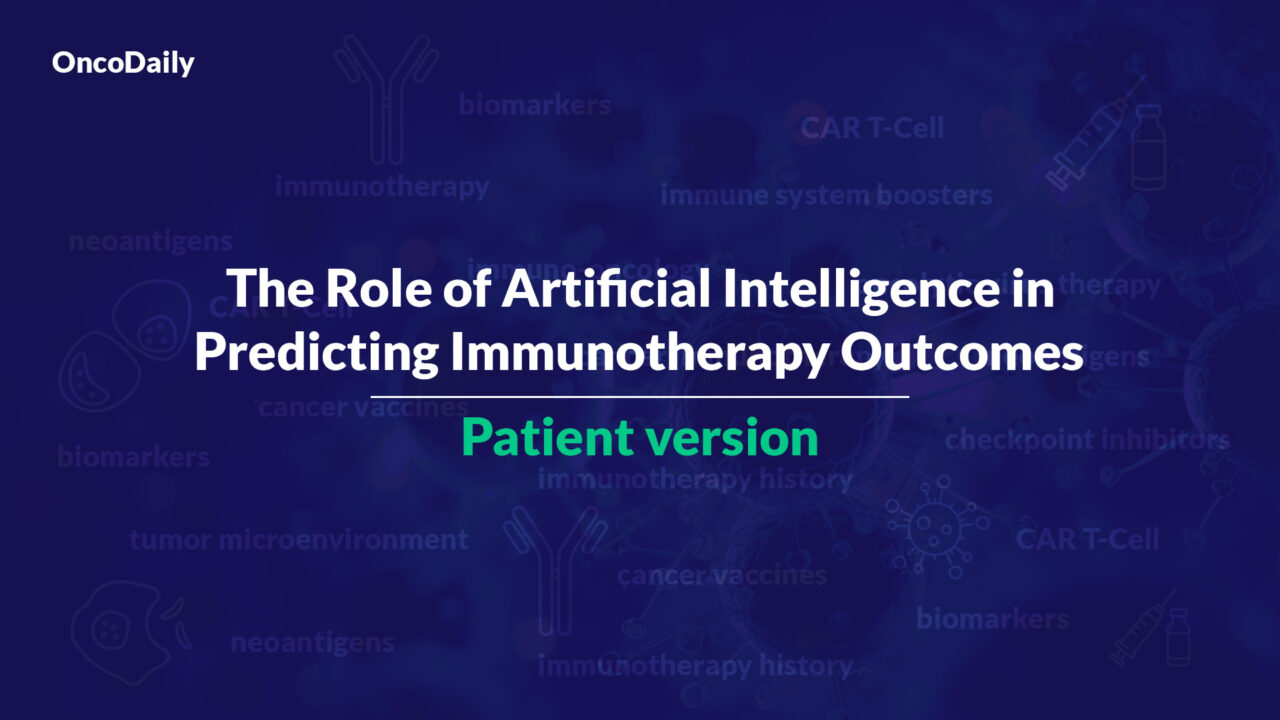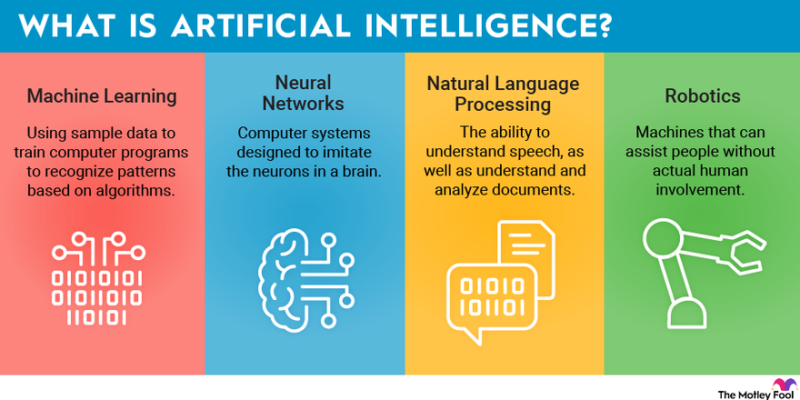
The Role of Artificial Intelligence in Predicting Immunotherapy Outcomes
Introduction
Immunotherapy has revolutionized cancer treatment by harnessing the body’s immune system to fight cancer cells. However, predicting which patients will benefit from immunotherapy remains a significant challenge. Artificial Intelligence (AI) is emerging as a powerful tool to address this challenge by analyzing complex medical data to predict immunotherapy outcomes more accurately. This article aims to explain how AI works, what immunotherapy is, the current methods for predicting immunotherapy outcomes, and how AI is enhancing these predictions.
What is Artificial Intelligence and How it Works
Artificial Intelligence (AI) refers to the ability of machines to perform tasks that typically require human intelligence. These tasks include learning from experience, recognizing patterns, making decisions, and solving problems. AI systems work by processing large sets of data through algorithms, which are sets of rules or instructions that the computer follows to perform a task.
Key Components of AI
- Machine Learning (ML): A subset of AI that enables computers to learn from data without being explicitly programmed. ML algorithms identify patterns in data and use these patterns to make predictions or decisions.
- Deep Learning (DL): A type of ML that uses neural networks with many layers (hence “deep”) to analyze various data types, such as images and text, to make more accurate predictions.
- Natural Language Processing (NLP): This allows AI to understand and interpret human language, making it possible to analyze medical records and other text-based data.
- Computer Vision: This enables AI to interpret and make decisions based on visual data, such as medical images.

This image is taken from fool.com
What is Immunotherapy
Immunotherapy is a type of cancer treatment that helps your immune system fight cancer. Unlike traditional treatments like chemotherapy and radiation, which directly target cancer cells, immunotherapy boosts the body’s natural defenses to identify and destroy cancer cells.
Types of Immunotherapy
- Checkpoint Inhibitors: These drugs block proteins that prevent the immune system from attacking cancer cells. Examples include drugs that target PD-1, PD-L1, and CTLA-4.
- CAR T-Cell Therapy: This involves modifying a patient’s T-cells (a type of immune cell) to better recognize and attack cancer cells.
- Cancer Vaccines: These vaccines stimulate the immune system to attack cancer cells.
- Cytokines: These are proteins that enhance the immune system’s ability to fight cancer.
Existing Approaches to Predicting Immunotherapy Outcomes
Predicting who will benefit from immunotherapy is crucial for personalized treatment plans. Several methods are currently used to predict immunotherapy outcomes:
Histopathological Features
Pathologists examine tissue samples under a microscope to identify features that may indicate how well a patient will respond to immunotherapy. AI can assist by analyzing these images more quickly and accurately.
Imaging-Omics
This involves using advanced imaging techniques, such as CT scans and MRIs, to gather detailed information about the tumor. AI algorithms can analyze these images to predict treatment outcomes.
Genomics and Proteomics
Genomic analysis involves studying a patient’s DNA to identify mutations that may affect their response to immunotherapy. Proteomics focuses on the proteins expressed by these genes. AI can analyze these complex datasets to identify patterns that predict treatment success.
Liquid Biopsies
These are blood tests that detect cancer-related substances, such as circulating tumor DNA. AI can analyze these biomarkers to predict how well a patient will respond to immunotherapy.
Clinical Data
Patient data, including age, sex, medical history, and previous treatments, can be used to build predictive models. AI can integrate this data with other types of information to improve prediction accuracy.
How Well AI Works in Predicting Immunotherapy Outcomes
Artificial Intelligence (AI) has shown great promise in predicting how well patients will respond to immunotherapy, often performing as well as traditional methods. Here are some ways AI is making a difference:
Improved Accuracy
AI algorithms can analyze vast amounts of data to identify subtle patterns that may be missed by human experts. This leads to more accurate predictions of who will benefit from immunotherapy. For example, AI can examine medical images, genetic information, and other data to find indicators that suggest whether a patient will respond well to treatment.
Speed and Efficiency
AI can process and analyze data much faster than humans, allowing for quicker decision-making and treatment planning. This means that doctors can get the information they need to make treatment decisions more rapidly, which is crucial for patients who need timely interventions.
Personalized Treatment
By integrating various types of data, AI can provide personalized treatment recommendations tailored to each patient’s unique characteristics. This means that instead of a one-size-fits-all approach, treatments can be customized to fit the specific needs of each patient, potentially improving outcomes.
Continuous Learning
AI systems can continuously learn and improve from new data, enhancing their predictive capabilities over time. As more data is collected and analyzed, AI models become better at making accurate predictions, which can lead to better treatment strategies in the future.
Ongoing Clinical Trials and Proofs
Several ongoing clinical trials and studies are providing evidence that AI can be incredibly helpful in predicting immunotherapy outcomes. For instance, a study by GE HealthCare and Vanderbilt University Medical Center showed that their AI models could predict patient responses to immunotherapy with 70% to 80% accuracy. This study used data from electronic health records, making it easier to implement in various clinical settings.
Researchers at Ludwig Cancer Research developed an AI-driven model called TRTpred, which can identify the most effective cancer-killing immune cells with about 90% accuracy. This model has been tested in preclinical studies and has shown promising results in eliminating tumors in mice, paving the way for future clinical trials in humans, such as the Optimising Cancer Therapy And Identifying Causes of Pneumonitis USing Artificial Intelligence (OCTAPUS-AI) trial.
The Nivolumab and Pembrolizumab Dose Optimisation in Solid Tumours With CURATE.AI Platform and Sequential ctDNA Measurements trial also exploring the use of AI for personalized dose optimization of immunotherapies.
More information about ongoing clinical trials can be found on clinicaltrials.gov
What Information AI Needs for Predictions
For AI to make accurate predictions, it needs access to a wide range of data:
Medical Images
High-quality images from CT scans, MRIs, and other imaging techniques provide detailed information about the tumor’s size, shape, and location. AI can analyze these images to detect features that may indicate how well a patient will respond to immunotherapy.
Genomic Data
Information about a patient’s genetic makeup, including mutations and gene expression levels, helps AI identify biomarkers associated with treatment response. For example, certain genetic mutations may make a tumor more likely to respond to specific immunotherapy drugs.
Proteomic Data
Data on the proteins expressed by a patient’s genes can provide insights into how the tumor is likely to behave and respond to treatment. Proteins play a crucial role in cell function, and changes in protein expression can affect how a tumor responds to therapy.
Clinical Data
Patient demographics, medical history, and previous treatments are essential for building comprehensive predictive models. This data helps AI understand the broader context of a patient’s health and how it might influence their response to immunotherapy.
Liquid Biopsy Data
Blood tests that detect cancer-related substances provide real-time information about the tumor’s status and response to treatment. Liquid biopsies are less invasive than traditional tissue biopsies and can be performed more frequently, providing ongoing insights into how a tumor is responding to therapy.
The Future of AI in Immunotherapy
The future of AI in predicting immunotherapy outcomes looks promising. As technology advances, AI systems will become even more sophisticated, capable of analyzing larger and more complex datasets. This will lead to even more accurate predictions and better patient outcomes.
Integration with Other Technologies
AI will likely be integrated with other emerging technologies, such as wearable devices and mobile health apps, to provide real-time monitoring and personalized treatment recommendations. This integration will enable continuous data collection and analysis, further improving the accuracy of predictions.
Ethical Considerations
As AI becomes more prevalent in healthcare, ethical considerations will become increasingly important. Ensuring patient privacy and data security will be paramount. Additionally, addressing potential biases in AI algorithms will be crucial to ensure fair and equitable treatment for all patients.
Collaboration Between AI and Healthcare Professionals
The collaboration between AI and healthcare professionals will be essential for the successful implementation of AI in predicting immunotherapy outcomes. AI can assist healthcare professionals by providing valuable insights and recommendations, but the final decision will always rest with the healthcare provider. This collaboration will ensure that patients receive the best possible care.
Conclusion
Artificial Intelligence is transforming the field of cancer treatment by improving the accuracy and efficiency of predicting immunotherapy outcomes. By analyzing complex datasets, AI can identify patterns and biomarkers that help determine which patients are most likely to benefit from immunotherapy. This leads to more personalized and effective treatment plans, ultimately improving patient outcomes. As AI technology continues to advance, its role in healthcare will only become more significant, offering new hope for patients battling cancer.
Sources
- Advances in artificial intelligence to predict cancer immunotherapy outcomes
- An Introduction to Artificial Intelligence in Healthcare
- Artificial intelligence for prediction of response to cancer immunotherapy
- Informing immunotherapy with multi-omics driven machine learning
- Overview of artificial intelligence in medicine
- Facts and Hopes on the Use of Artificial Intelligence for Predictive Biomarkers
- The potential for artificial intelligence in healthcare
- Multi-omics and artificial intelligence predict clinical outcomes of immunotherapy
- Artificial intelligence for predictive biomarker discovery in immuno-oncology
- How Does AI Work? Basics to Know
- What Is Artificial Intelligence (AI)? – investopedia.com
- Predictive biomarkers for cancer immunotherapy with immune checkpoint inhibitors
- Biomarkers for Immunotherapy: Current Developments and Future Directions
-
Challenging the Status Quo in Colorectal Cancer 2024
December 6-8, 2024
-
ESMO 2024 Congress
September 13-17, 2024
-
ASCO Annual Meeting
May 30 - June 4, 2024
-
Yvonne Award 2024
May 31, 2024
-
OncoThon 2024, Online
Feb. 15, 2024
-
Global Summit on War & Cancer 2023, Online
Dec. 14-16, 2023
